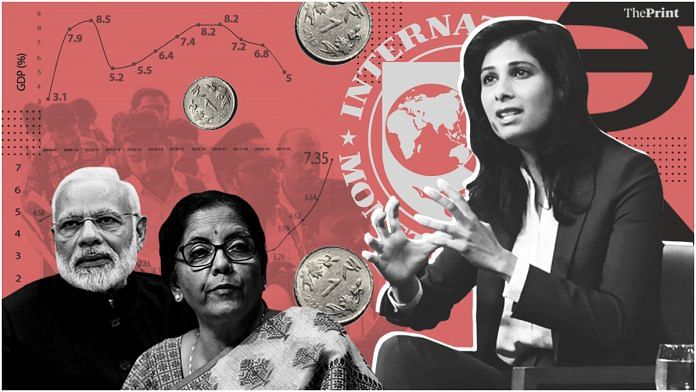The International Monetary Fund has pegged India’s economic growth forecast to 4.8 per cent for 2019-2020, much less than its October 2019 projection of 6.1 per cent. IMF chief economist Gita Gopinath also blamed India’s GDP numbers for the organisation’s downward revision of global economic growth.
ThePrint asks: Has IMF’s Gita Gopinath made India a convenient scapegoat by blaming it for global slowdown?
Blaming India is far-fetched because causation typically runs from advanced economies to developing economies
 D.K. Joshi
D.K. Joshi
Chief economist, Crisil
The global GDP growth for 2019 has been marked down in the IMF’s latest World Economic Outlook report. India’s GDP growth forecast has been marked down for fiscal years 2020 and 2021, most of which is reflected in the slowdown of global economic growth. But you cannot look at the two in terms of causation. India’s slowdown is largely due to domestic factors.
India is a large economy and the sharp decline in its growth forecast, to 4.8 per cent, will have an impact on the world economy numerically but not materially. Saying that India’s stagnating growth is capable of causing a global slowdown seems pretty far-fetched because causation typically runs from advanced economies to developing economies.
In terms of purchasing power parity, the basis upon which growth rate is measured, India is the third-largest economy in the world. So, if India’s economy gets marked down by even 200 basis points, this is sure to reflect on the global economy. The IMF report also recognises a slowdown among advanced countries and the risks they face. However, India has come under the spotlight because it is the only major economy that has seen the sharpest slowdown.
India’s economic slowdown is continuing because of financial sector issues. The recovery will be gradual because the real economy of goods and services and the financial sectors continue to feed into each other, and India’s monetary and fiscal policies have limited ability to juice up the economy. So, for FY 2020-21, luck factors such as crude oil and monsoons will be critical.
Global economy not autonomous from India’s and vice versa. India shouldn’t feel apologetic or defensive
 Arvind Mayaram
Arvind Mayaram
Former Finance Secretary
I don’t think the IMF has an incentive to blame any particular country — India in this case — for the global growth slowdown unless its numbers add up to corroborate the same. The global economy is, virtually, the sum total of all economies in the world. To put it into perspective, India is currently the world’s fifth-biggest economy in terms of purchasing power parity, and it ranks seventh now in terms of GDP among the largest economies in the world.
So, when one of the largest emerging market economies in the world like India has been growing at barely 5 per cent, it will undoubtedly have a major contribution to the global economic numbers.
If India is proud of being one of the fastest-growing economies, it ought to accept the grim reality of a sharp economic slowdown. There is no reason for the country to be defensive or apologetic about it.
Moreover, the global economy is not autonomous from India’s and vice versa. The current slowdown in India has been exacerbated by external factors, as many economists have pointed out, but it’s important to remember that domestic factors are at the root of it. The agricultural crisis, the impoverishment of rural areas, fall in demand, a sharp contraction in the investment rate, demonetisation and the faulty design of the GST are primary factors in the sharp decline in India’s growth rate.
Protectionist policies of US, Europe are responsible for global slowdown. So, IMF can’t blame India
 Gopal Krishna Agarwal
Gopal Krishna Agarwal
National spokesperson of BJP on Economic Affairs
India is being affected by the current global growth slowdown and it’s not the other way around, as what IMF chief economist Gita Gopinath has projected. It is the protectionist policies of the United States and Europe on manufacturing and agriculture that are negatively impacting India’s domestic growth.
European countries and the US follow stringent regulatory restrictions through general data protection rules, data localisation requirements and taxation of global income of its residents; like the Foreign Account Tax Compliance Act and profit transferring policies. But these same countries demand liberal policies for e-commerce companies in India. Similarly, until the time the WTO and the General Agreement on Tariffs and Trade dealt with manufacturing industries and trade relations, these were being vigorously pursued, but when developing countries like India pushed for agriculture and services to be included within the WTO rules, western countries threatened to pull out and make the regulatory body ineffective.
India’s IT-based industries and their employees face serious restrictions under US’ data privacy laws and the H1-B visa guidelines. India’s agriculture, pharma and other industries have to bear with phytosanitary and other non-financial restrictions globally.
Even the Free Trade Agreement (FTA) is not favouring India’s domestic industries, which justifies our action of asking ASEAN countries to review the pact. India has always been liberal in its approach to international trade.
Issues like the US-China trade war, the Iran nuclear deal and economic sanctions through currency settlement restrictions have serious implications on the global economy and are impacting India’s domestic growth.
There is a bi-directional causation for India’s growth and global growth — it is not a one-sided story
 N. R. Bhanumurthy
N. R. Bhanumurthy
Professor, NIPFP
After the 2008 global recession, any growth in the world economy has come from the emerging market economies, namely China and India, in the form of a co-movement. Actually, the European Union itself has been struggling to recover since 2008 and other countries, like Brazil, are still dealing with remnants of the recession.
I think it would be unfair to call India a scapegoat in terms of the IMF’s latest revisions for the global growth rate. I do acknowledge that there is a bi-directional causation for India’s growth and global growth — it is not a one-sided story. However, India’s slowdown is more a result of domestic factors than external factors, like exports of services or intermediate goods. The fall in demand is the main culprit.
This argument makes more sense if you decompose India’s demand into components like household, corporate, government and external demand like exports. Right now, if the Indian economy was suffering only due to subdued external demand, the country should have been growing at 6 or 7 per cent. However, India is currently growing at less than 5 per cent, which suggests a worrying concern that every component of demand is slowing down.
Views are personal.
India now finding mention in IMF’s commentary probably because its current chief economist is an India-born
 Remya Nair
Remya Nair
Senior Associate Editor, ThePrint
The International Monetary Fund lowered India’s growth forecast to 4.8 per cent for 2019-20, probably one of the lowest forecasts ever made for the Indian economy by any financial institution. IMF’s chief economist Gita Gopinath said that the biggest contributor to the downward revision to the global growth forecast was India.
This is surprising given that in the past, India’s economic growth has found little mention in the IMF commentary as part of the World Economic Outlook report. Over the last few years, India has never been credited for pulling up global growth when many developed economies were contracting or seeing a sharp deceleration and the Chinese economy was facing a sharp slowdown.
The spotlight on India now reflects the country’s growing size and heft in the global market. In terms of nominal GDP, India has become the fifth-largest economy in the world and remains one of the fastest-growing economies despite growth expected to fall to a 11-year low of 5 per cent in 2019-20.
Another reason for India finding increasing mention in the commentary is probably because an India-born economist is now the IMF’s chief economist, someone who has also been a close observer of the Indian economy.
Also read: Inflation at 7.3% and growth at 5% — is Indian economy facing stagflation?
By Pia Krishnankutty, journalist at ThePrint
This copy has been updated to reflect a change. Gita Gopinath was incorrectly identified as IMF chief. She is the IMF’s chief economist. We regret the error.




The IT cell / troll army should be instructed to Cease and desist.
Gita Gopinath is India-born; not an Indian-born
It is funny how willing India was to go with predictions of it’s greatness and of it’s status as a superpower of the future when the BRICS were all the rage, but how Indian economists and political pundits grasp at straws now that the country is accused of having a deleterious effect through mismanagement upon the global economy because of how important India is to the world! If you’re happy to accept the bouquets when things are going right, it makes it equally appropriate to accept the brickbats when you slip up. The hard fact is that India is an important member of the global economy, and what happens there WILL affect the rest of the world. There’s no room of “the dog ate my homework” type of excuses that some are quick to resort to now that the Indian economy has hit bumps and potholes of it’s own making.
Hitting the nail right in the middle of the head
For the last thirty years, China has made a solid contribution to raising global growth, sucking in vast quantities of raw materials, energy, agricultural commodities, exporting manufactured goods, now also capital and execution capacities for infrastructure projects. There is the famous statistic – cannot vouch for its veracity – of how it has poured more concrete in the last couple of decades than America has since the Declaration of Independence. India was never in the same league. However, the reasonable expectation was that it could essay a comparable odyssey of three decades of somewhat lower but still impressive growth. Welcome at a time when the First World is struggling to get past 2%. So if India starts crawling at 4.8% ( 2.3% according to some mischievous economists ) that becomes a disappointment for the IMF and the rest of the world. If we like showers of rose petals, especially from foreigners, we should earn them.